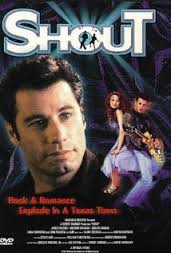
SHOUT
US, 1991, 89 minutes, Colour.
John Travolta, James Walters, Heather Graham, Linda Fiorentino, Richard Jordan, Gwyneth Paltrow.
Directed by Jeffrey Hornaday.
Shout is reminiscent of Herbert Ross's Footloose, a focus on a small American town, leadership, especially religious leadership, condemning modern trends of music and dancing. Shout is set in the early to mid-'50s, the period of rock and roll. John Travolta, as a teacher with a secret, has an opportunity to do a variation on Robin Williams' teacher in Dead Poets Society.
The film is definitely formula, always predictable. James Walters is the hero, doing a John Travolta Junior with the look of James Dean. Heather Graham is the heroine. Richard Jordan is the very heavy manager of a boys' home. The film debut of Gwyneth Paltrow.
The film shows something of the '50s, the attitude towards rock and roll. It shows boys in a home - doing all the predictable things and, basically, quite lovable. The focus is also on the sexual awakening between the hero and the daughter of the home manager. The film seems aimed at pubescent 12-year-old girls.
1. Picture of an American town? The '50s? Music and rock and roll? Authority? Relationships?
2. The title, the impact of rock and roll? The musical score, the songs, the contrast with band music and the emerging rock and roll?
3. The small town, Jesse ringing the bell, trying to wake it up? The school, the church? The Benedict boys' home, the desert, the working place? The home itself?
4. The focus on Jesse: the James Dean look, the John Travolta rebel? Drinking, ringing the bell, smashing the bottles, going to the home, clash with Benedict? The rebel, digging the pit? Standing his ground? Antagonism towards Cabe, picking his nose, Cabe's reaction? Playing the music? His relationship with the other boys, the leadership? Attraction towards Sarah, carrying the cases, Oops? His surly reaction, the bet? His seductive manner, after throwing the dirt at her? Bradley telling him - telling her the truth? Her slapping him? The meetings, the young love? Going out on the town, the fight? The clash with the sheriff? Jesse wanting to run away, playing with the black group at the club, the exhilaration? Cabe persuading him not to go? The reaction to Cabe, the truth? The 4th of July, playing, the playing of rock and roll and the rebellion, everybody joining in? Cabe coming - and his supporting him? His decision to stay in the home? The relationship with Sarah, the sexual encounter - a future? The rebel without a cause of the '50s?
5. Cabe, the music teacher, arriving in the town, the clash with the sheriff, the rock and roll music, attracted to Molly? Interviews with Benedict? Benedict's suspicions? The band and its poor playing, the rock and roll, the records, the radio and the Midnight Rider? Encouraging the boys, playing in the band with them? Friendship with Molly, clash with the sheriff? The boys going to the club, his urging Jesse to play? The clashes with Jesse, the friendship? Talking things over, persuading him not to run away? His own escape from the police, telling the story of his partner, playing in the white club, the white man attacking him, his violent response? His decision to go with the police? Encouraging the boys?
6. Benedict, the caricature of the severe manager, the emphasis on discipline? His treatment of the boys, the physical exercises, picking on the fat boy, targeting Jesse? Digging the pits? Carrying the luggage? Friendship with people in the town? Love for his daughter, her rebellion against him? Against the music? The visits to church? The preparation for the 4th of July, the report on Cabe? His comeuppance and being surrounded by the rocking and rolling?
7. Sarah, her arrival, the sexual attraction, clashes with Jesse? Her work in the home, in the dining room? Targeted by Jesse in revenge against her father? Throwing the dirt, the seductive tones, playing the guitar? Her attraction towards him? Hearing the truth, slapping him, his return to her room? His fear? The sexual encounter? Breaking free of her father? The finale?
8. Brad, playing the piano, Cabe encouraging him to play without the music, imitating the monkey walk, etc. and freeing him up? His honourable attitude towards Sarah, not wanting the bet, telling her? Attracted to her? His fixing the radio, listening to the Midnight Rider? Playing with the band?
9. The other boys: the fat boy, the bet, the small youngster? The work on the farm, milking the cows? The bet? Going out on the town? Allan and his attraction to the girls from the school? The boys going out at night, meeting the girls at the school gate, playing the rock and roll?
10. The picture of youngsters, the changing times, music as the symbol? The adult generation, their severity and authority? The religious minister attacking rock and roll? The changing times?